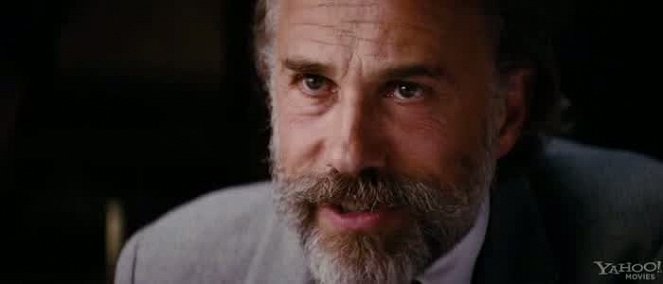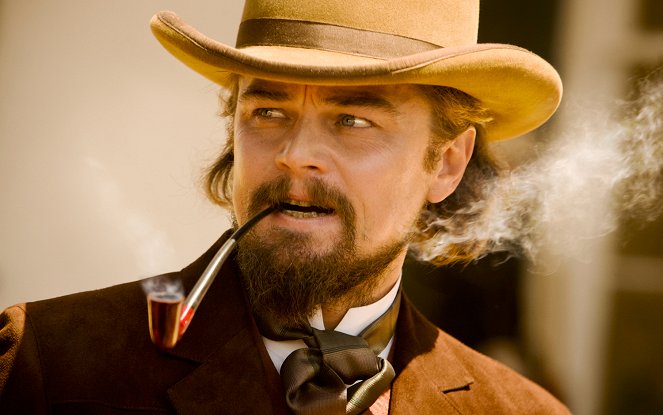Directed by:
Quentin TarantinoScreenplay:
Quentin TarantinoCinematography:
Robert RichardsonCast:
Jamie Foxx, Christoph Waltz, Leonardo DiCaprio, Kerry Washington, Samuel L. Jackson, Walton Goggins, Dennis Christopher, James Remar, David Steen (more)Plots(1)
Django (Jamie Foxx), a slave with a violent past, earns the favour of bounty hunter Dr. King Schultz (Christoph Waltz) when he helps him kill a trio of infamous murderers. Schultz frees Django and begins training him as a fully-fledged bounty hunter. The pair enjoy further success tackling some of the American South's most troublesome criminals, but Schultz gradually becomes aware that Django has motivations beyond earning a reward - Django has been searching for his wife, Broomhilda (Kerry Washington). When the duo discover that she is enslaved to the ruthless Calvin Caddie (Leonardo DiCaprio) they begin hatching a plan for her rescue. However, with Caddie's employees numbering the vigilant Stephen (Samuel L. Jackson) and mindful bodyguard Butch (James Remar), it may well be the pair's biggest challenge yet. (Sony Pictures Releasing)
(more)Videos (42)
Reviews (17)
SPOILERS AHEAD. My second viewing of Django Unchained clarified some seeming structural faults (the triple ending, the ineffectiveness of the romantic storyline), but it still seemed to me that the film has fundamental problems with pacing and cohesion: the continuously changing tone is quite gratuitous, some shots and scenes stick out of the film (the double cameo by Zoe Bell as a woman watching the approaching Django and Schultz from a window and as a gang member). It doesn’t matter that the characters do a lot of talking about things for which a single shot would have sufficed – Tarantino has always been stronger at interior dialogue than narrative images, so we can understand the landscape here as serving a purely decorative purpose. What’s problematic, however, is that some of the dialogue-heavy scenes don’t push the narrative along, nor do they offer any other value added such as slowly built-up tension (which was a major component of Inglourious Basterds). The strangely edited KKK digression after the Brittle brothers are captured (the inserted flashback seems somewhat confusing at first) is nothing more than filler. One storyline concludes, but the next (Hildi) hasn’t yet been opened. The narrative stands still for several minutes. Schultz’s subsequent familiarisation of Django with the rules of the market mechanism initiates the transformation of the slave into a master, which culminates with a radical change of wardrobe. Together with the education in capitalism, however, there is the rather unnecessary (in terms of the narrative, not the viewing experience) training of Django to be the fastest gunslinger in the American south. Despite that, the multi-layered transformation of the protagonist ranks among the best instances of character development in Tarantino’s entire filmography. From the beginning, we are prepared for Django to take over responsibility from his master, toward whom he first behaves like a little boy, eager to learn what has become of his German princess. However, he gradually exhibits more and more independence, though the roles he has to play, which definitely do not suit him, prevent him from fully expressing himself (his microworld has to be subordinated to Schultz’s, with which he later comes into conflict, powerfully for the first time in the scene with the dogs). With all the more bombast in the blaxploitation-style climax, he can take on the position of head moral authority, throw off all masks (and the saddle from his horse) and, as a completely free hard-ass black motherfucker, shoot about two dozen white devils (and one assimilated black man who reveres his master more than his own mother and undergoes a similar shift in meaning in relation to his master as Django does). Finally, Django explicitly sets out to do what Tarantino does behind the camera – break down stereotypes. Most of the characters that the German former dentist and the freed slave encounter correspond to a certain archetype from American mythology or from exploitation cinema (mammy, the Southern belle, the villain obsessed with eugenics). Unfortunately, Hildi is no exception; for Tarantino, she is an unusually one-dimensional female character who is mostly allowed only to cry, scream and be rescued. Django Unchained is an incredibly stylish affair, excellent in many of its constituent parts (soundtrack, actors, punchlines) and bold in its refusal to respect the conventions of westerns (though Italian directors had much earlier violated some of them, e.g. shooting a horse and using white American cowboys as villains), but as a whole, the film is not entirely cohesive. In terms of making an impression, however, it is almost perfect with respect to the intensity of viewing pleasure and I will watch some of its scenes many more times.
()
(less)
(more)
I consider myself a rational man, a person of science, and an admirer of natural laws. I do not believe in water spirits and witches, I smile at the products of astrologers, and I shrug at the belief in prophecies and magic. Occasionally, however, I come across a mystery - something that clearly transcends the boundaries of our world, something that cannot be explained by logic or ordinary thinking processes. I understand why Tarantino made a name for himself with Pulp Fiction. His screenplay cleverly worked with references and pop culture, and it was innovative and funny. But as new titles emerged, the ideas from them disappeared, the effort to be cool turned into awkwardness, quotes turned into copying, and the attempt to meet fans' expectations led to a loss of sanity. However, surprisingly, his success persisted. It's hard to say what the ecstatic admirative comments stem from. Perhaps it's mass suggestion, unknown drugs, or bribes (but in that case, Tarantino shamefully left me out). In the whole movie, I find maybe two funny scenes - the introduction of Christoph Waltz and the encounter with the Ku Klux Klan. The rest is about as funny as the humor of a circus clown from the cheapest provincial circus after a few shots of vodka. The screenplay is unremarkable, relying on poorly written characters, which the director, by the way, doesn't know how to work with. The result is a worn-out, over-stylized, and clichéd film with an excessive runtime. A director like Martin McDonagh knows how to have perspective, playing with genre expectations, and pulp aesthetics in films like In Bruges or Three Billboards Outside Ebbing, Missouri, and overall is several levels above Tarantino. You can interpret Django Unchained however you want, but for me, it's a case of a decently cast, but completely mishandled film. For a long time, I tended to overlook Tarantino's self-centeredness, lack of sanity, and obvious missteps, but now he's getting the full brunt of my dissatisfaction, perhaps even for my previous disappointments. Overall impression: 10%.
()
Not much of an homage to spaghetti westerns, despite Franco Nero's cameo, rather, some kind of (commendable) anti-racist prod that doesn't even make much sense at the end. The experience resembles a sine wave, as long as Waltz is on screen with his enthusiasm, it's a treat that honours even Western rules. But from the moment we meet DiCaprio, the film goes downhill in quality, where the genre's name would best fit the phrase "typical Tarantino crap" and where the "warrant in your pocket" moment (what a coincidence!) is such a cheap, illogical screenwriting crutch that only a naive viewer can buy it. I could expect anything from Tarantino, but not a cliché like this. And the violence, with hectolitres of squirting ketchup, is so over-stylized (especially in the final carnage) that I'm actually tired of it. PS: The scene with the Ku-Klux-Klan will make anyone laugh, myself included.
()
Black dynamite. A provocative kick in the balls, which Tarantino inflicts with xenophobia and racism in the field of the "white man" genre, such as the western (but at the same time, in a way, he does not spare the "niggaz"). If I am to blame Django Unchained for anything, it would be that, in addition to the fact that some parts really look like they were edited by a high negro using autogen, then perhaps just its very digital look. I know that Tarantino simply wanted to give the western locations a modern patina, and I know he didn't want to unnecessarily tie himself down with spaghetti western conventions, but in some places Django Unchained looks stylistically quite weak (rather, it lacks style - I think it is important to see Django Unchained in the movie theatre mainly so that one can enjoy the choruses of laughter). But I would end the criticism there. Perfect punch lines (they don't hit you - they tear your balls out and stuff them down your throat), great acting attached to great characters, absurd black humor, irresistible volatility between sublime epics, blaxploitation and grind-house blood, dramatic timing that Tarantino won me over with despite my years of resistance in Inglourious Basterds. What I enjoy most about his new films is how he turns his light, bloody and disrespectful hand against great history and "sociocultural" concepts. This black version of the Nibelungs, where the white pride of the KKK can't see through the bags on the road and a German drinking beer is fighting against the colonels in white... well, it just grabbed me by the balls.
()
A little inconsistent, but still the best western for the past god knows how many years. Django Unchained has three parts. The first is an enthralling introduction (the story about Siegfried), again dominated by the absolute genius Christoph Waltz. The second, wordy one, with cultivated dialogues, the amazing candy-muncher DiCaprio, who is surpassed only by Samuel L. Jackson as the (self-proclaimed) “filthiest darn nigger of all times". You can do nothing but revel in his masterfully feigned brown-nosing. The third part, for the most part an action inferno, where blood flows by the gallon, Jamie Foxx steals for himself. Personally I’m not usually his biggest fan, but here he’s perfect, he acts exactly how he’s supposed to and nails the entire development of Django as a person with ease. Camera, editing and direction are almost flawless, as is customary for Tarantino’s movies. The music is just right, mainly the old instrumentals by Ennio and Jerry Goldsmith. One of the movies of the year. Those lyin', goddamn time-wastin' sons of bitches...
()


